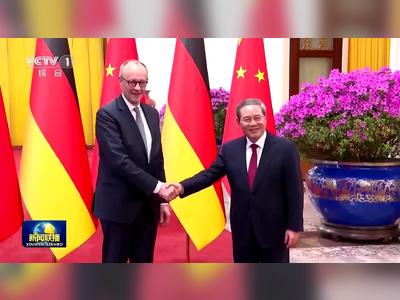
Trump Renews Tariff Threats Against EU and China as Trade Tensions Escalate
U.S. President Donald Trump once again threatens to impose tariffs on the European Union and China, pointing to trade disparities and issues with fentanyl.
On Tuesday, U.S. President Donald Trump announced fresh tariff threats aimed at the European Union and China, emphasizing his administration's focus on trade imbalances and illegal trafficking.
During an address at the White House, Trump mentioned that tariffs on the EU and a possible 10% duty on imports from China were being considered, with a deadline set for February 1, 2025. These measures align with his broader initiative to enforce tariffs on countries accused of unfair trade practices, including Mexico and Canada, particularly in response to fentanyl trafficking and illegal migration.
Trump's comments followed a day after he held off on immediately imposing tariffs as he had pledged during his campaign.
His latest statements have heightened market insecurity, as U.S. trade groups and financial markets had briefly anticipated a more lenient stance.
White House trade adviser Peter Navarro highlighted that the proposed tariffs were intended to pressure Mexico and Canada to tackle illegal drug and migrant flows, which Trump associates with national security concerns.
In reaction, China reiterated its dedication to dialogue and cooperation with the U.S., while cautioning against the adverse effects of a trade war.
The Chinese government expressed concern about the potential tariffs, stressing that no one benefits from a trade conflict.
In a recent press briefing, Mao Ning, China’s foreign ministry spokesperson, stated that Beijing would resolutely protect its national interests.
Meanwhile, Trump's administration continues to advocate for a thorough review of U.S. trade practices, including an examination of ongoing trade deficits and unfair practices, especially with China.
A recent trade memorandum signed by Trump instructs federal agencies to investigate issues like currency manipulation and suggests a global supplemental tariff.
The president’s memo also discusses adjusting the de minimis exemption for low-value shipments, commonly used to import fentanyl precursor chemicals.
While trade experts imply that Trump’s strategy might be more measured to ensure legal clarity, the new tariff threats could further disrupt international trade relations.
In retaliation, leaders in Mexico and Canada have shown a commitment to safeguarding their sovereignty, with Mexican President Claudia Sheinbaum reaffirming that any renegotiation of the U.S.-Mexico-Canada free trade agreement will not occur before 2026.
U.S. industries, particularly farmers, have voiced concerns about the effect of additional tariffs on exports, notably corn and ethanol shipments to Mexico and Canada.
The National Corn Growers Association has urged caution, emphasizing the importance of preserving trade with these crucial markets.
During an address at the White House, Trump mentioned that tariffs on the EU and a possible 10% duty on imports from China were being considered, with a deadline set for February 1, 2025. These measures align with his broader initiative to enforce tariffs on countries accused of unfair trade practices, including Mexico and Canada, particularly in response to fentanyl trafficking and illegal migration.
Trump's comments followed a day after he held off on immediately imposing tariffs as he had pledged during his campaign.
His latest statements have heightened market insecurity, as U.S. trade groups and financial markets had briefly anticipated a more lenient stance.
White House trade adviser Peter Navarro highlighted that the proposed tariffs were intended to pressure Mexico and Canada to tackle illegal drug and migrant flows, which Trump associates with national security concerns.
In reaction, China reiterated its dedication to dialogue and cooperation with the U.S., while cautioning against the adverse effects of a trade war.
The Chinese government expressed concern about the potential tariffs, stressing that no one benefits from a trade conflict.
In a recent press briefing, Mao Ning, China’s foreign ministry spokesperson, stated that Beijing would resolutely protect its national interests.
Meanwhile, Trump's administration continues to advocate for a thorough review of U.S. trade practices, including an examination of ongoing trade deficits and unfair practices, especially with China.
A recent trade memorandum signed by Trump instructs federal agencies to investigate issues like currency manipulation and suggests a global supplemental tariff.
The president’s memo also discusses adjusting the de minimis exemption for low-value shipments, commonly used to import fentanyl precursor chemicals.
While trade experts imply that Trump’s strategy might be more measured to ensure legal clarity, the new tariff threats could further disrupt international trade relations.
In retaliation, leaders in Mexico and Canada have shown a commitment to safeguarding their sovereignty, with Mexican President Claudia Sheinbaum reaffirming that any renegotiation of the U.S.-Mexico-Canada free trade agreement will not occur before 2026.
U.S. industries, particularly farmers, have voiced concerns about the effect of additional tariffs on exports, notably corn and ethanol shipments to Mexico and Canada.
The National Corn Growers Association has urged caution, emphasizing the importance of preserving trade with these crucial markets.
Translation:
Translated by AI
AI Disclaimer: An advanced artificial intelligence (AI) system generated the content of this page on its own. This innovative technology conducts extensive research from a variety of reliable sources, performs rigorous fact-checking and verification, cleans up and balances biased or manipulated content, and presents a minimal factual summary that is just enough yet essential for you to function as an informed and educated citizen. Please keep in mind, however, that this system is an evolving technology, and as a result, the article may contain accidental inaccuracies or errors. We urge you to help us improve our site by reporting any inaccuracies you find using the "Contact Us" link at the bottom of this page. Your helpful feedback helps us improve our system and deliver more precise content. When you find an article of interest here, please look for the full and extensive coverage of this topic in traditional news sources, as they are written by professional journalists that we try to support, not replace. We appreciate your understanding and assistance.











